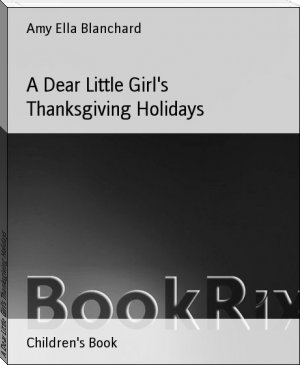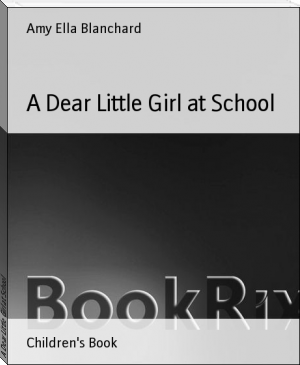A Sweet Little Maid - Amy Ella Blanchard (e reader books .txt) 📗

- Author: Amy Ella Blanchard
Book online «A Sweet Little Maid - Amy Ella Blanchard (e reader books .txt) 📗». Author Amy Ella Blanchard
"Dear, dear mamma, I'll never go away again without your leave. I don't want to make you unhappy, mamma. I do love you."
"I know you do, darling; but little girls sometimes forget that it is more by the doing than by the saying that their mothers are made aware of their love. You know papa always tells you that if you really love your parents, you will do the things that please them, otherwise, no matter how much you say 'I love you,' it doesn't mean anything."
Dimple looked very sober, and Florence, too, listened to all this with a very grave face. It had really been a very trying day for the two little cousins, and now that they were safe, they realized how uncomfortable it had been. Therefore, from that time there never was a question of their going outside the gate without permission, and Mr. Atkinson's place was no longer visited unless by his express invitation on Saturday afternoons.
"I feel as if I had been sort of ungrateful," said Dimple, the next day after their rescue. "I just love my home, Florence, and somehow I don't feel a bit bad about not going to Mr. Atkinson's. I believe I know exactly how the little birdies feel when they get back to the nest, after they have been trying to fly. I hope I shall never go so far away again, until I am much older." And the two returned contentedly to their old playground, only too glad to feel the security of familiar sights and sounds.
CHAPTER IX
Down Town
"Don't you want to go down town for me, girls?" said Mrs. Dallas, one pleasant morning. "I can't send Bubbles very well."
"Oh, yes," said Dimple. "What are we to get?"
"Several things," replied her mother. "Go and get ready and I will tell you."
"May we take Celestine and Rubina?" asked Florence.
"I don't think I would, for you will have packages, and they will be in the way."
"Don't let's take them anyhow, Florence," said Dimple. "I was thinking this morning that their frocks are too thick for summer." So they ran off to get ready.
"Now," said Mrs. Dallas, as they came back, "I want you to go to Fink's and get me four yards of trimming like this sample; if they haven't exactly like it, the nearest will do. Then I want you to get me four lemons. You may go to old Mrs. Wills for those, and if she has any fresh eggs you may get a dozen, and--oh, yes, a bottle of vanilla extract. Now don't be too long, for I shall want to use some of the things this morning."
They promised, and went off without delay. It was a pleasant July morning, and they started gaily down the street, which was shaded by trees and bordered on each side by pretty cottages, with gardens in front.
"There is Mrs. Brown," said Dimple; "let's cross over, Florence, she will be sure to stop us if we don't."
"Who is Mrs. Brown?" asked Florence.
"Oh, she's a woman," returned Dimple. "I suppose she is very nice, but she is so solemn, and is always telling me that she hopes I will grow up to be a comfort to my mother and not a care and burden; and she always says it as if there wasn't the least doubt but that I would be a care and a burden, and I don't like her. Do you know mamma and Mrs. Hardy have been friends for over twenty years, and mamma is Rock's godmother?"
"How do you know?"
"Mamma told me. I asked her how she came to know Rock's mother, and she said she used to know her when she was a little girl like me--and when they were young ladies they were great friends. Then mamma was married and came here, and Rock's mother was married and went to California. When her husband died she came back to Baltimore to live. Here is Fink's; we have to go in here."
This was the largest dry goods shop in the town, and the clerks all knew Dimple.
"What can we do for you this morning, Miss Dallas?" said one of them, leaning over the counter.
"Mamma wants four yards of this trimming," said Dimple, holding out her sample.
The man took it, turned it over to examine both sides, and took down a box.
"Four yards, did you say?"
"Yes," said Dimple.
He measured it off, saying, "Don't you want some cards? We have some just in with a lot of goods."
"I would rather have a box," said Dimple; "for I have a new doll, and I want it to put her sashes in."
"You don't object to having both, do you?" said he. "Suppose I put the cards in the box. How would that do?"
"Oh, that would be very nice," said Dimple; "you are very kind."
As he went off, she turned to Florence and said in a low tone, "I didn't like to ask him for two boxes, but I will give you the cards."
"No matter," said Florence. "I don't care very much for a box."
However, when the man returned he had two boxes with four pretty cards in each.
"Thank you so much," said the girls, highly pleased.
"He is a real nice man," said Florence, when they were in the street. "I didn't believe he would think of me."
"Yes, I think he is nice," said Dimple; "besides he has known me ever since I was a baby; he mightn't be so nice to a stranger."
They next came to a little low brown building with one window. As they went in at the door, a small bell over it tinkled and a voice said, "In a minute."
While they waited they looked about the shop, which was quite a curiosity to Florence. In the window were jars of candy, red and white, gingerbread horses, shoestrings, oranges, lemons, and dolls strung along in a line, the largest in the middle and the smallest at each end; besides these there were tops, whistles, writing paper, pencils, scrap pictures, and a variety of other things, all jumbled up together. Inside, the glass case and the shelves were full, and from the ceiling hung rolls of cotton in tissue paper, toy wagons, jumping-jacks and hoops.
"What a funny place," whispered Florence; but just then a funnier old woman came in. Her face looked like a withered apple, it was so wrinkled and rosy; her eyes were bright and her grey hair was combed back under a high white cap. As she came behind the counter, Florence saw that one of her hands was very much scarred, and the fingers bent. She wondered what had happened to it.
"Well, little Dallas girl, it's you, is it? And how is my pretty with her dimples and curls? Hm! Hm! Hm! The little Dallas girl," said the old woman.
"Mamma wants four lemons, Mrs. Wills," said Dimple.
"Four lemons; four--four--" said the old woman, going to a box and taking them out.
"And she wants to know if you have any fresh eggs?"
"Fresh eggs. Hm! Hm! Fresh eggs. How many? I'll see."
"A dozen if you have them."
"Well, we'll have to go and find them, little girls. Who is the other little girl?"
"My cousin," said Dimple.
"A Dallas?"
"No; her name is Florence Graham."
"Graham, Graham. A Dallas and a Graham. Come you two, then, and we'll see if we can find any eggs."
They followed Mrs. Wills through the back room into the yard. The room they passed through was very clean, and held a stove with a little tin kettle on it, a bed with a patchwork quilt, a shining little table and several chairs with flowers painted on them.
The yard was quite a curiosity, and seemed to be given up entirely to pigeons and chickens, who made a great fuss, flying up on the old woman's shoulder and pecking at her; while an old duck waddled solemnly after, giving a quack once in a while to let them know she was there.
Mrs. Wills took them to the hen-house, and told them where to look for eggs.
As Dimple had been there before, she knew where to look, and they soon made up the dozen.
The old duck followed them into the house, and was waddling after them into the shop, when Mrs. Wills with a "Shoo! Shoo!" drove her out.
"Now, Dallas girl, and Graham girl," said Mrs. Wills, "does the mother need anything else to-day?"
"There was something else," said Dimple, "but I can't think what. Can you, Florence?"
"There were four things, I know," said Florence. "But I don't remember the fourth."
"A--apples, B--brooms, C--crackers, D--dust-pans," went on Mrs. Wills, rapidly, and then paused.
"No; not any of those," said Dimple.
"E--extract," said Mrs. Wills.
"Yes, that's it. You have guessed, Mrs. Wills, vanilla, please."
"E--extract, E--extract," said the old woman, as she hunted in a dark corner.
"And C--cocoanut cakes. Red or white?" she asked, opening the case.
"White," said Dimple. "But Mrs. Wills----"
"Tut! Tut! Don't you say it; don't you say it, or I'll take back my eggs," she said, as she handed each of the children a cake.
"Thank you, Mrs. Wills. When I'm grown-up I'll make you a great big cake and send it to you," said Dimple.
That pleased the old woman mightily, and she nodded good-bye to them, saying, "Lemons, eggs and extract," over and over to herself.
"What a ridiculous old woman!" said Florence. "Is she crazy?"
"No," said Dimple. "But she is queer. She is good, though, and mamma always buys everything from her that she can, and she feels so bad if I don't take the things she offers me that I have to accept them."
"What is the matter with her hand?"
"She burned it trying to save her child from burning."
"Did she save it?"
"No; and that is what makes her so queer. She has never been the same since."
"My! how warm it is getting," said Florence. "I am glad we have broad brimmed hats. Let's hurry home. There is your Mrs. Brown again."
"Oh, dear!" said Dimple. "Let us turn up this street; it is just as near to go home this way." So they turned the corner and reached home before Mrs. Brown knew which way they had gone.
"Suppose we watch Sylvy make cake," said Dimple, when they had delivered their packages. "She always lets me watch her. And then we can scrape the bowl. Don't you like to?"
"I never do at home," said Florence. "Our cook is so cross and mamma does not like me to go into the kitchen."
"My mamma doesn't care; she lets me go whenever I please, and sometimes I help Bubbles clean knives and do such things, so she can get through, and play with me sooner."
"Sylvy, we are coming to watch you make cake; may we?"
"I'm not a carin'!" said Sylvy. "Git 'round on the other side of the table."
"See her break the eggs," said Florence. "Could you





Comments (0)